New Online Sales Tax Legislation: Why Is It Interesting?
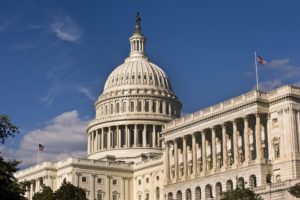
As you know, we’ve been following the online sales tax debate for years. From the Marketplace Fairness Act to states taking matters into their own hands, it’s been interesting to follow as lawmakers debate how to handle imposing state sales tax on internet retailers. It’s especially difficult given the wide variety of taxes and fees that would need to be imposed at a state, county and city level.
New Online Sales Tax Bill: No Regulation Without Representation
The latest legislation coming from Washington DC is called the No Regulation Without Representation Act. Unlike previous bills, this one would actually remove the ability for states to collect online sales tax by essentially codifying the physical presence standard set in the US Supreme Court case Quill Corp v. North Dakota (1992). What would that mean for taxpayers? It would define physical presence (and that you have to have it in order for a state to impose its taxing scheme), as Quill did, and also likely create a de minimis threshold. The bill would essentially eliminate click through nexus standards and affiliate nexus rules currently being imposed by various states.Read more
How Did Washington Expand Nexus? The Latest State Tax Legislation
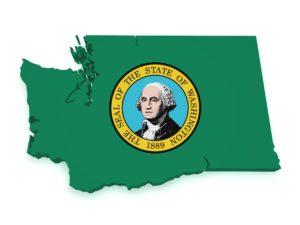
Over the last few years, Washington has taken an interesting approach to its nexus and state tax law. Back in 2015, it adopted a click-through statute and economic nexus thresholds for businesses making sales in the state. Washington currently has a few other interesting bills up for debate, but in the meantime the Department of Revenue (DOR) enacted another piece of legislation that affects economic nexus.
About Washington State Tax Law HB 2163
Washington’s DOR explains how this new state law affects nexus and business and occupation (B&O) tax alongside a few examples on its website. Here’s a brief summary.Read more
AMNESTY PROGRAM DIRECTED AT FBA SELLERS

There is a new scheduled amnesty program that may help businesses correct overlooked tax obligations if they have been selling products and services in other states. Many companies engage in multi-state sales through an intermediary, like Amazon, eBay and similar organizations called “fulfillment services.” The fulfillment centers place a seller’s inventory in warehouses in multiple states to expedite shipping, but in the process, create nexus for the seller in those states. As such, the sellers have an obligation to collect sales tax and pay income tax. Unfortunately, unpaid taxes may incur penalties and interest. Now there may be a short time window to correct these errors and avoid interest and penalties.
On Monday, July 31, the nexus committee of the Multistate Tax Commission (MTC) approved the MTC to participate in a multistate sales tax amnesty program for third-party sellers whose only nexus with a state is the use of fulfillment services offered by third-party marketplaces. The MTC is an intergovernmental state tax agency working on behalf of states and taxpayers to facilitate the equitable and efficient administration of state tax laws that apply to multistate and multinational enterprises.
FOCUS ON SOUTH DAKOTA

This month takes us to the Mount Rushmore state of South Dakota. South Dakota is the 5th least populous state in the U.S., with a population of 865,454 people in 2016. It is also the 5th least densely populated state in the country. South Dakota is in the north-central United States, and is considered part of the Midwest by the U.S. Census Bureau. It is also part of the Great Plains region, which covers most of the western two-thirds of the state. West of the Missouri River the landscape becomes more and more rugged, consisting of rolling hills, plains, ravines, and steep flat-topped hills called buttes. In the south part of the state, east of the Black Hills, lies the Badlands of South Dakota. Erosion from the Black Hills, marine skeletons that fell to the bottom of a large shallow sea that once covered the area, and volcanic material, all contribute to the geology of this area.
Ohio's New Online Sales Tax: Now Cookies Can Create Nexus?
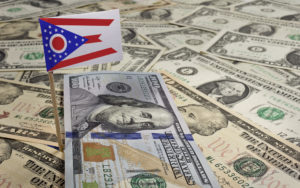
What do cookies, nexus and online sales tax have to do with each other? States are continuing to look for ways to justify charging sales tax to internet retailers; Ohio just took a page out of Massachusetts’ book.
Massachusetts’ Online Sales Tax Directive 17-1
A couple of weeks ago we shared that Massachusetts created a directive that redefined nexus to include internet cookies, which meant that the state was recognizing these bits of computer code as a way to establish a physical presence, therefore making internet retailers responsible for collecting and remitting sales tax from online shoppers.Read more
The Nexus Discussion - Some Practical Examples
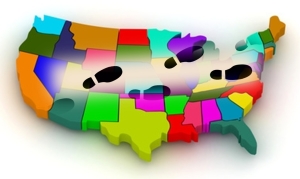 Almost every conversation in and around state tax consulting begins with nexus. Why? Because it’s still of utmost importance to companies to know whether they have nexus, or taxable presence, in a state such that the state can require them to register to collect and remit sales tax and/or to pay income based or franchise taxes. If a company doesn’t have taxable presence, then they are not obligated to file in a particular state. I’ve been practicing in state tax for longer than I care to admit, and I still have this conversation daily with existing clients and new clients as we talk about their potential exposure to taxes in multiple states. It doesn’t help that states are getting more aggressive and creative (maybe a little too aggressive and creative) in defining what constitutes nexus.
Almost every conversation in and around state tax consulting begins with nexus. Why? Because it’s still of utmost importance to companies to know whether they have nexus, or taxable presence, in a state such that the state can require them to register to collect and remit sales tax and/or to pay income based or franchise taxes. If a company doesn’t have taxable presence, then they are not obligated to file in a particular state. I’ve been practicing in state tax for longer than I care to admit, and I still have this conversation daily with existing clients and new clients as we talk about their potential exposure to taxes in multiple states. It doesn’t help that states are getting more aggressive and creative (maybe a little too aggressive and creative) in defining what constitutes nexus.
Since the infamous 1992 Supreme Court case, Quill Corp. v. North Dakota, 504 U.S. 298 (1992), we’ve been talking about nexus as it relates to substantial physical presence in a state. What sorts of things create that physical presence? I often tell clients that it is like having “boots on the ground”. While “substantial” is also a subjective term, it includes the following activities engaged in within a state. Most of them seem fairly straightforward, so I’ve included some examples of specific items we often encounter with clients.
Employees located in a state
Generally, when companies think of creating nexus by virtue of employees located in a state, they’re thinking of employees physically residing in the state, or coming to work in a company office in the state. However, other employee activities in the state can also create nexus. Consider the following scenarios:
- A company salesman works from his home in Texas. But his territory, which he travels into regularly to generate sales, includes the neighboring states of New Mexico, Arizona, Oklahoma and Louisiana. Depending on the number of days spent in each state, he likely has created nexus for the company, not just in Texas, but in the other states as well.
- A different company employee engaged in operations, travels to every jobsite of the company and assists with the installation of the company product, confirmation that it functions correctly and other initial troubleshooting. This employee has likely also created nexus for the company in most states he visits.
What's New in Massachusetts? An Online Sales Tax Update

A couple of weeks ago we summarized Massachusetts’ Directive 17-1, a new piece of online sales tax legislation that redefined physical presence to include downloaded apps and internet 'cookies' - the data websites store on users' computers and phones to track visits. While Directive 17-2, which repealed the prior directive, was announced at the end of June, the original law redefining physical presence (or nexus) was so distinctive that we wanted to take a closer look at the rule.
Massachusetts’ Online Sales Tax Directive 17-1
What made this state’s approach to online sales tax so uncommon? Sylvia Dion, our colleague and a principal at PrietoDion Consulting Partners, provides a nice summary in a recent blog post for SalesTaxSupport.com. I’ve included a few of her key points below, but the reason so many opposed it (including trade groups) is that it redefines nexus, twisting established precedent to justify collecting sales tax from internet vendors.
It’s worth noting that, unlike other states that have enacted online sales tax legislation, Directive 17-1 was established as an administrative policy from the Massachusetts Department of Revenue rather than the state legislature. Also, because the directive clearly targets "internet vendors," there is a strong argument that it could be discriminatory.
The most interesting part of this directive, however, is the detailed discussion and justification accompanying it, contorting previous precedent and state law to increase the number of online retailers responsible for charging customers for state sales tax.Read more
FOCUS ON OKLAHOMA
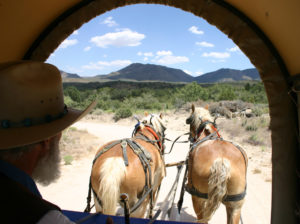
This month brings us to the Sooner State of Oklahoma. The state lies between the Great Plains to the West and the Ozark Plateau to the East and is in the Gulf of Mexico watershed, generally sloping from the high plains of its western boundary to the low wetlands of its southeastern boundary. With small mountain ranges, prairies, mesas and eastern forests, most of the state lies in the Great Plains, Cross Timbers, and the U.S. Interior Highlands, a region prone to severe weather.
Oklahoma is on a confluence of three major American cultural regions and historically served as a route for cattle drives, a destination for southern settlers, and a government-sanctioned territory for Native Americans.
What You Need to Know About Massachusetts and Online Sales Tax

Over the last couple of months we’ve been taking a closer look at how various states are approaching the issue of online sales tax. Some states, like Washington and Nevada, have enacted “Amazon Laws” that make some retailers responsible for collecting and remitting state sales tax. Other states, such as Arizona, haven’t created new legislation directly about the issue yet and seem to be waiting to see how the debate is settled, either in Congress or through other states’ laws.
Today we look at a state that has been a little bit slower to enact online sales tax legislation, but is starting to make changes internet retailers need to know about: Massachusetts. Keep reading for the details.Read more
IT'S ALL GREEK TO ME!- US MULTISTATE TAX & FOREIGN COMPANIES

I just returned from an amazing vacation – a cruise of the Mediterranean. We started in Athens, Greece; spent just a couple days there enjoying the history, and then boarded our ship. The cruise took us to the Greek isles of Santorini and Crete, and then we sailed to Italy, the beautiful St. Tropez, France, and finally Barcelona, Spain. We finished our vacation by sampling many, many tapas and wines in Barcelona. About midway through our vacation, I found myself wondering – how could I do US multistate tax consulting somewhere in Europe? I’m still working on that angle, and will certainly keep you posted.
But meanwhile, on the flip side of that equation, we’ve been engaging with several foreign companies who have US operations and find our state tax laws to be, well, challenging! As I tell all my foreign clients – trust me, they are challenging for US companies too! Here are some of the main things for foreign companies to think about as they begin doing business in the US.


















